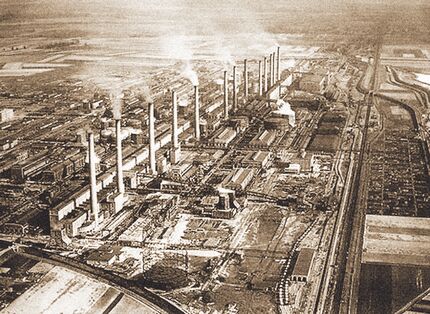History of the site
The Leuna chemical site can look back on a long and significant history dating back to 1916. In that year, Carl Bosch founded an ammonia plant on behalf of BASF, laying the foundations for Leuna's development into a major international chemical site.
Thanks to Carl Bosch's visionary plans and great commitment, Leuna soon achieved international visibility.

An era of technological innovation began in Leuna with the industrial introduction of ammonia synthesis. As early as 1923, methanol was produced here for the first time in the world using a high-pressure process. At the end of the 1920s, Matthias Pier set another milestone with the development of lignite hydrogenation for the production of synthetic fuels and established Leuna as a location for the mineral oil industry.
1938 was a particularly significant year in Leuna's history when the chemists succeeded in synthesising caprolactam, which is used in the production of Perlon. This innovation brought great joy to the international women's world and cemented Leuna's reputation as a centre of chemical innovation.
The series of successes in the introduction of large-scale processes continued, and by the outbreak of the Second World War, Leuna had developed into the largest company in the German chemical industry. One example of this is the world's first production plant for the manufacture of synthetic surfactants.
Even after the Second World War, Leuna remained an important name in the chemical industry. Production continued under the East German flag, and today's investors continue to benefit from the excellent infrastructure and the raw materials network, which includes crude oil from Russia and ethylene from the Czech Republic.
Continuous development and a future-orientated focus have enabled the Leuna chemical site to undergo impressive development in its more than 100-year history.
Originally characterised by coal chemistry with a transition to petrochemistry, Leuna is now a pioneer in the transformation to sustainable chemistry and makes a significant contribution to the development of climate-neutral production processes. As a supplier for almost all production and service sectors, the chemical industry plays a central role in this transformation process.

